Movie Review – First Man
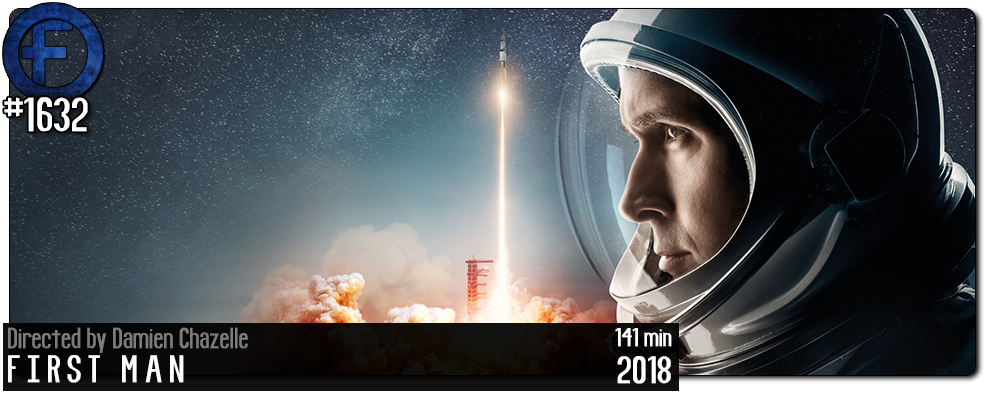
Principal Cast : Ryan Gosling, Claire Foy, Jason Clarke, Kyle Chandler, Corey Stoll, Gavin Warren, Pablo Schreiber, Christopher Abbott, Patrick Fugit, Lukas Haas, Shea Wigham, Brian d’Arcy James, Corey Michael Smith, JD Evermore, Ethan Embry, Ciaran Hinds, Kris Swanberg, William Gregory Lee.
Synopsis: A look at the life of the astronaut, Neil Armstrong, and the legendary space mission that led him to become the first man to walk on the Moon on July 20, 1969.
********
Not to be confused with the 2018 Aardman flick about soccer-playing cavemen in prehistory, First Man sees Whiplash and La La Land director Damien Chazelle again court awards season glory with this gripping recount of the story of Neil Armstrong, the first man to set foot upon the moon, and his journey to that most famous of historical achievements.
Following the death of his infant daughter Karen, NASA test pilot Neil Armstrong (Ryan Gosling – Drive) buries himself in his work, developing rockets and craft capable of flying into space and – hopefully – landing on the moon. His relationship with his wife Janet (Claire Foy – The Crown) is tested with his moody insular behaviour, his grief over Karen’s passing never quite dissipating. His colleagues, including Ed White (Jason Clarke – Zero Dark Thirty), work with him under the command of NASA chief Deke Slayton (Kyle Chandler – King Kong), to develop both the original Gemini missions and then, eventually, the Apollo missions to land men on the moon. Together with mission specialist Michael Collins (Lukas Haas – The Revenant) and arrogant co-pilot Buzz Aldrin (Corey Stoll – Ant-Man), Armstong and the United States’ race to the moon is intended to thwart the Russians, who are developing rockets of their own.
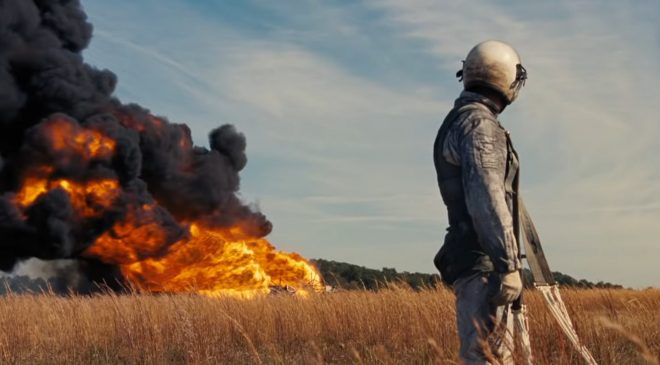
Chazelle’s thrilling space drama is in every sense as awe-inspiring and compelling as the story it tells ever was. There’s something about man’s journey to our closest celestial neighbour in the wake of JFK’s untimely death, and the heroism displayed by the astronauts of NASA’s early space programme that eternally captivates us all; the core thread of our human commonality that resonates so acutely in this day and age of populism and partisan societal change. While Armstrong himself was notoriously private, even in the wake of his history-making journey to the lunar surface, the facts of the moon landing and NASA’s mission to get there have been examined in exacting detail on the big-screen before; notably, films such as The Right Stuff, Apollo 11, and to a lesser extent The Dish and Capricorn One have brought the historic moment of man’s exceptionalism to life in ways audiences have latched onto.
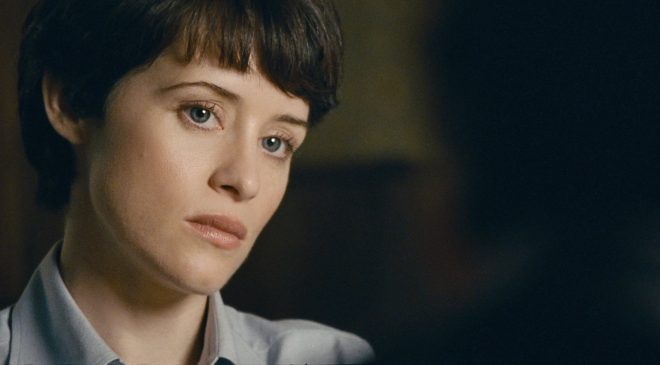
First Man is another entry into this marvellous canon and while I did have difficulty connecting emotionally with Gosling’s portrayal of Armstrong himself, the supporting performances and an utterly captivating production design and sense of claustrophobic terror kept me absolutely riveted to the screen. Written by Josh Singer (based loosely on the biographical book on Armstrong’s life by James Hanssen), First Man’s focus starts off on the relationship between a grief-stricken Armstrong and his wife, and transforms into a cathartic voyage into the unknown for his personal redemption. It’s kind of The Martian in reverse, although Gosling’s Armstrong is a less approachable character than Matt Damon’s role ever was. In First Man, Armstrong is often sullen and angry – rightfully so, given Karen was only 2 when she died from brain cancer – and this anger is used as a motivator for him to succeed. Janet’s constant state of maternal frustration at her husband’s gradual distance emotionally (let alone physically!) feels like the prototypical archetype of left-behind-military-wife, and is well written and believable. While theirs is not the “greatest love story ever told”, it adds a sense of humanity to a public figure the world has always been fascinated by and idolised.
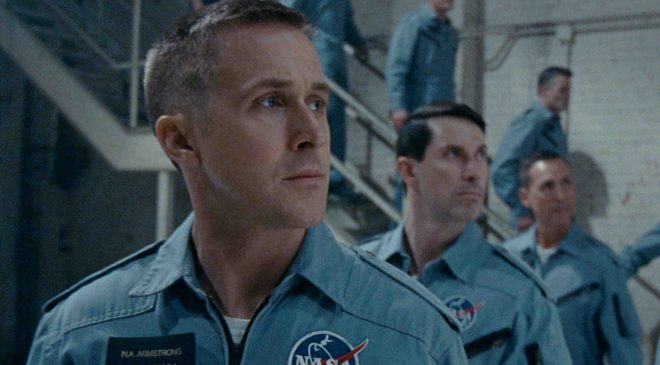
The film’s latter half deals primarily with NASA’s mission to the moon, skipping a lot of the preamble and going right for Armstrong’s known space ventures, including a paralysing journey above the atmosphere with David Scott (Christopher Abbott) in Apollo 8, the first spacecraft to dock in orbit with another before critical system failure saw it plummet back to Earth. The film’s flight and space depictions are superbly rendered, with Chazelle largely using a first-person sense of impending doom to project the inherent terror in the sequences. In a rarity for these kinds of films, Chazelle keeps the camera inside the craft being piloted by Armstrong, never allowing us to see anything more than the real-life occupants of each mission would have been able to. If they don’t know what’s going on outside the rocket, neither do we. It’s a unique perspective shift from the typically all-over-the-place techniques modern cinema employs, and it really did ratchet up the sense of claustrophobia and inescapable dread. The interiors of the spacecraft are cramped and tin-can-like, a startling realisation (again) of the odds stacked against these men as they hurtled through the unknown in a vessel with about as much room as a standard family sedan. Dangerous and isolated, the pressure within and without the Gemini and Apollo missions was exceptional, and Chazelle’s direction promotes this most viscerally.
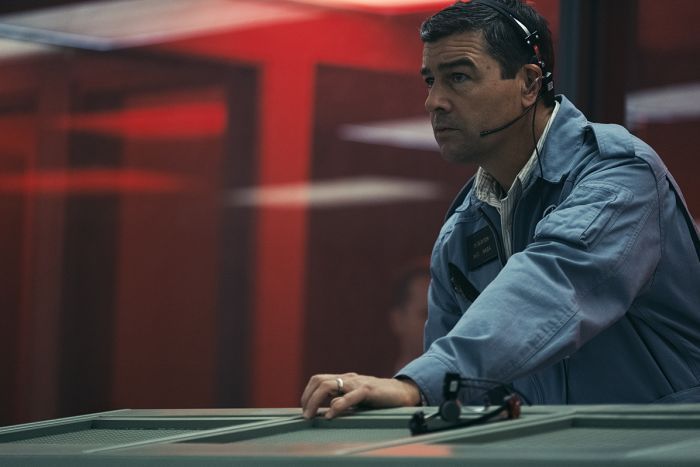
When it isn’t a stunning replication of period-era spacecraft and tech-n-costume design, First Man is a generally excellent actor’s statement. Gosling’s performance hones in on the actor’s typically brooding style, where much is unsaid and a lot is intimated with a look or a glance rather than exposition. The dynamic with Foy’s Janet, herself a strong-willed woman also grieving and struggling to bring up the couple’s other children in the face of a general ostracising from her partner, doesn’t feel prescient beyond the immediacy of the story but Foy, to her credit, elevates potentially pedestrian material alongside Gosling’s more inward-looking Armstrong and offers a memorable supporting role. Smaller roles to the likes of Kyle Chandler, Jason Clarke (as Armstrong’s best friend), Shea Wigham as Gus Grissom, Ciaran Hinds as a NASA director, and the abrasive Corey Stoll as Buzz Aldrin, flesh out the tableau on which Neil Armstrong’s place in history is remembered, all of whom are generally excellent (although I should say Stoll is exceptional in his minor role as Aldrin, while Clarke epitomises the American ideal with his heroic but understated Ed White) and directed well in the larger ensemble.
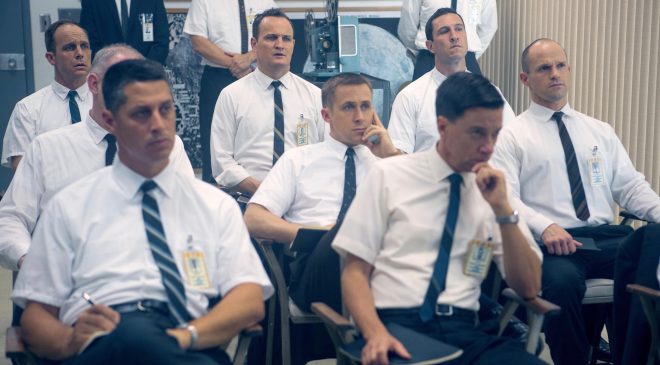
At times busily heroic, at others oppressively melancholy, First Man is a terrific attempt to bring humanity to one of history’s most famous names amid the sheer audacity of achievement, and with minor caveats delivers all it sets out to. I’m not the biggest fan of Gosling’s grumblemumble style of performance (this is more like Drive than La La Land) but I have to say he did epitomise a grief-stricken father with resolute success compulsions to a T; on his shoulders, and that of an admirable Claire Foy and Chazelle’s restrained yet terrifying direction of the film’s thunderous spaceflight sequences, First Man is an absolute winner that examines the people behind the greatest technological leap of our time and delivers a resounding, gobsmacking success.


I love the high score. It has a nice spot on my Top 20 I’ll be posting next week and I hate that it has been overlooked by so many. I’m a big fan.
I suspect it’ll be an also-ran at the Oscars – it should gather a Best Picture nomination, but I think it’s lost momentum to a few other films. Definitely a low-key classic.